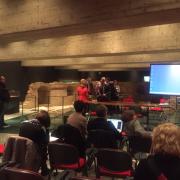 I have been planning for some time to participate in the Organisational learning, knowledge and capabilities (OLKC) conference and finally managed to do it in the 2015 edition of the event organised at the Università Cattolica del Sacro Cuore in Milan, Italy. The conference is an interesting, fairly small annual organisational learning, knowledge (and information) management conference with quite a lot of interesting content for information science and information and knowledge management people even if the bulk of the participants represent disciplines like sociology, organisational studies and education. It is quite apparent that it would be highly useful to do a bit cross-breeding between this community and for instance, the regulars of the ISIC information behaviour conference. The discussion at OLKC on knowing as a practice and its links to information practices could be useful for the information behaviour community whereas the OLKC community could benefit of acquiantance of such concepts as information non-sharing (e.g. discussed by Talja already in 2002; compare the new idea of knowledge hiding discussed lively at the OLKC conference) and information seeking (cf. knowledge seeking discussed in Milan as similarly novel concept). Also the information science literature on participatory information services, participatory archives and similar concepts could be useful in the OLKC context.
I have been planning for some time to participate in the Organisational learning, knowledge and capabilities (OLKC) conference and finally managed to do it in the 2015 edition of the event organised at the Università Cattolica del Sacro Cuore in Milan, Italy. The conference is an interesting, fairly small annual organisational learning, knowledge (and information) management conference with quite a lot of interesting content for information science and information and knowledge management people even if the bulk of the participants represent disciplines like sociology, organisational studies and education. It is quite apparent that it would be highly useful to do a bit cross-breeding between this community and for instance, the regulars of the ISIC information behaviour conference. The discussion at OLKC on knowing as a practice and its links to information practices could be useful for the information behaviour community whereas the OLKC community could benefit of acquiantance of such concepts as information non-sharing (e.g. discussed by Talja already in 2002; compare the new idea of knowledge hiding discussed lively at the OLKC conference) and information seeking (cf. knowledge seeking discussed in Milan as similarly novel concept). Also the information science literature on participatory information services, participatory archives and similar concepts could be useful in the OLKC context.
The theme of this year's conference revolved around the concept of practical authorship coined by John Shotter (University of New Hampshire) and developed further by him and Ann Cunliffe (University of Bradford). My conference presentation discussed the role of boundary objects as instruments of practical authorship and the elaboration of the notion of practical authorship itself with a more nuanced understanding of authorship as tenure of liabilities, privileges and rights rather mere acknowledgement of who made or did something.
